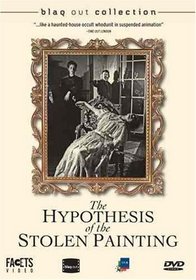| Actors: Jean Rougeul, Chantal Paley, Jean Raynaud, Daniel Grimm, Isidro Romero Director: Raoul Ruiz Creators: Sacha Vierny, Patrice Royer, Pierre Klossowski Genres: Indie & Art House, Drama, Mystery & Suspense Sub-Genres: Indie & Art House, Drama, Mystery & Suspense Studio: FACETS VIDEO Format: DVD - Black and White,Color,Full Screen - Subtitled DVD Release Date: 09/26/2006 Original Release Date: 01/01/1978 Theatrical Release Date: 00/00/1978 Release Year: 2006 Run Time: 1hr 6min Screens: Black and White,Color,Full Screen Number of Discs: 1 SwapaDVD Credits: 1 Total Copies: 0 Members Wishing: 3 MPAA Rating: Unrated Languages: French Subtitles: English |
Search - The Hypothesis of the Stolen Painting/The Suspended Vacation on DVD
  | The Hypothesis of the Stolen Painting/The Suspended Vacation Actors: Jean Rougeul, Chantal Paley, Jean Raynaud, Daniel Grimm, Isidro Romero Director: Raoul Ruiz Genres: Indie & Art House, Drama, Mystery & Suspense UR 2006 1hr 6min HYPOTHESIS OF THE STOLEN PAINTING |
Larger Image |
Movie DetailsSimilar Movies
|
Movie ReviewsVicious Circle Eddie Watkins | Philadelphia, PA | 12/07/2006 (5 out of 5 stars) "This movie was (at least initially) inspired by Pierre Klossowski's novel The Baphomet, and was co-written by him. Klossowski, besides being the older brother of the painter Balthus, is also the author of a study of Nietzsche's thought entitled Nietzsche And The Vicious Circle; which is a study of perhaps his strangest idea, the eternal return. As The Baphomet is a novel based on principles of the eternal return, so is this movie. It is a mystery of sorts masquerading as a pseudo-documentary on an unknown (fictional) painter. All the surviving works by this painter are linked together into an enigmatic narrative made even more elusive by the absence of the one painting which is the key to the narrative circle (actually, any of the paintings, if missing, would've also been the missing key). The film is largely composed of live model reproductions of the paintings, and as the film progresses the actors within the paintings begin to move. The content of the missing painting is hypothesized by the convergence of the narratives extrapolated from the paintings on either side of it; but even the sequence of the paintings is hypothetical. It is a real head-piece, very tightly constructed - a baffling thought provoking gem. " One of the most genial and invective artistic proposals ever Hiram Gomez Pardo | Valencia, Venezuela | 03/10/2008 (5 out of 5 stars) "During the decade of the seventies, two brilliant Chilean filmmakers made the world turns around the attention about them. Raoul Ruiz and Alexander Jodorowsky, this last one decided to risk by surrealistic universes while Ruiz remained as creator of hallucinating atmospheres. I would not hesitate to state Raoul Ruiz meant for the cinema what Garcia Marquez in literature. His portentous imagination at the moment to present us his artistic proposals and convictions, with works that always challenge even the most exigent of the spectators, hovered by a nocturnal poetry and admirable visual metaphors. This film is one the most representative, imaginative and dazzling ones of the seventies, who according Raoul Ruiz' words is. "a fiction about theory". All begins when a pompous art collector proposes a new history of western based on a mesmerizing gallery of "living images" created by a forgotten artist. So, when our hard collector begins to drone away about aspects of his collection, the human figures smirk and fidget, introducing the spectator in another level of narrative proposal. A brilliant exercise of imagination and supreme good taste that brings us close to another two related films. Basil Dearden' s "Dead of night", 1945 and Richard Rush's "The stunt man" , 1980. " Vastly overrated. Robert P. Beveridge | Cleveland, OH | 06/23/2010 (3 out of 5 stars) "The Hypothesis of the Stolen Painting (Raoul Ruiz, 1979)
Raoul Ruiz' The Hypothesis of the Stolen Painting is one of those movies that you hear critics and film snobs going on endlessly about, and yet one that very few people who are not critics or film snobs have actually seen. I have now seen it, and I have discovered why: those critics and film snobs are blowing smoke. Yes, it's all quite pretty, but at its heart, The Hypothesis of the Stolen Painting is a one-trick pony that strives for a depth it never manages to achieve. The plot, what little there is of it, centers on two narrators, one unseen and one seen, the latter known as The Collector (8 ½'s Jean Rougeul), discussing a series of six (or is it seven?) paintings that caused a stir back in the day. As they discuss each, it becomes a three-dimensional tableau, through which the Collector walks as the two discuss the paintings. The more they discuss, the more it seems as if the old heresy mirrors a recent political crime. It really should be as good as everyone says. I adore two-person films (there are many more actors in the movie, but all of them are tableau figures), and a two-person film where one is never on camera? Brilliant! And yet, it never caught me the way it seems to have caught so many other people. Yes, it's all quite beautifully shot (in black and white), and there are some truly arresting scenes. What never comes together for me is the political aspect of the film. It's obviously there, but it's neither buried enough to be the subtle dark thread running through the film that Ruiz, I think, was aiming for, nor prominent enough to be in your face. It's just sort of there, contributing little at times, none the rest. I wanted to like it a lot more than I did, but if you're in the mood for something that's exceptionally well-shot but kind of brainless, this is perfect. ** ½ " |






